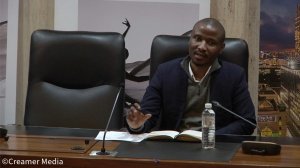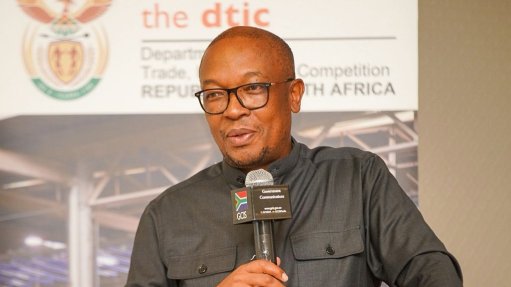Burgeoning renewable-energy industry presents legal considerations for stakeholders

A&O Shearman Projects counsel director Mongezi Dladla explains how renewable-energy projects are typically structured and financed; while A&O Shearman South Africa managing partner Gerhard Rudolph provides tangible examples of disputes experienced in renewable-energy projects in the country.
With renewable-energy demand set to continue to increase in South Africa in the coming years, industry players must be cognisant of how to manage risks and disputes in projects, and will also have to contend with unprecedented legal consequences that are emerging.
This was highlighted by speakers during an industry panel discussion facilitated by global law firm A&O Shearman, as part of the WABER & suDBE conference, which is being held this week at the University of the Witwatersrand.
A&O Shearman Projects counsel director Mongezi Dladla explained that sustained and increasing renewable-energy demand in the country was being driven by households and businesses looking to mitigate against loadshedding, offset the impacts of climate change and avoid high electricity tariff increases.
He highlighted that the abundance of solar and wind in the country positioned it competitively to undertake renewable-energy projects, and that these also took less time to build and start feeding energy into the national grid compared with traditional coal-fired power stations.
A&O Shearman South Africa managing partner Gerhard Rudolph added that battery storage systems demand would also become more prevalent.
A&O Shearman Disputes Resolution senior associate Wihan Meintjes, however, warned that renewable-energy projects were not without their challenges, with many having gone wrong and being the subject of disputes.
Further to traditional construction disputes that were typical of large-scale projects, he explained that renewable-energy projects presented unique complexities, which had already occurred and would continue to play out.
From his experience in the market, he said there had been pushback from the fossil fuel industry to the Renewable Energy Independent Power Producer Procurement Programme a few years ago, which was mainly driven by mineworker unions and resulted in interdicts being granted to delay several independent power producers (IPPs) from concluding power purchase agreements.
“That was based on legitimate fears at that time of coal-fired plants being descaled/decommissioned and families of coal miners suffering potential losses as a result. When we’ve got these regulatory and legislative changes aimed at promoting renewables, you will inevitably see some pushback from the fossil fuel industry. And that in and of itself, remains a bit of a risk in the market at the moment,” Meintjes pointed out.
With solar and wind positioned to remain main players in the renewable-energy space in the country, Meintjes said these projects were at risk from global supply chain issues, given that they were specialised fields and many of the components were not locally produced.
Another issue with these types of projects was that they often constituted new and fast-developing technologies, and were applied in places where they may have not been robustly tested for the requisite amount of time, Meintjes informed.
He said this had already resulted in disputes occurring, and that he expected this to become even more prevalent as there were attempts to allocate design responsibility and discern what the root causes of the issues were.
Meintjes said land claims were another issue. With projects being major both in terms of physical land size and monetary value, they may be the subject of land claims, which could delay or impede projects. He said this had already been experienced in the country and that stakeholders must remain vigilant about this as they endeavour to increase the country’s renewable-energy footprint.
Meintjes mentioned an emerging, novel issue unique to wind farms being “wake loss” caused by wind turbines.
He explained that the wind effects of a wind turbine can be felt downwind for up to 50 km downwind. Therefore, if competing wind farms were built within close proximity to each other, the downwind farm could experience adverse wake effects, causing detrimental impacts to generation capacity.
“This has raised several complex legal questions, as these are not typically claims that are founded in contract,” Meintjes explained, adding that it presented considerable challenges to establish, quantify and enforce such claims.
Moreover, Meintjes said there was also some uncertainty about offshore wind farms, with hesitancy to adopt it in the country at the moment. However, should this start gaining traction, it may result in more disputes on the technology side, owing to these being considerably more complex than onshore wind farms, he averred.
Rudolph added that Eskom had very recently taken on a “very protectionist stance” and lodged objections regarding granting of electricity trading licences through the National Energy Regulator of South Africa (Nersa).
He said that without rapid intervention by government and Nersa to establish rules around electricity trading, this would be very disruptive in terms of how the existing Eskom generation and distribution network would coexist with IPPs as well as prospective traders wanting to exploit the liberalisation of energy in the country.
Article Enquiry
Email Article
Save Article
Feedback
To advertise email advertising@creamermedia.co.za or click here
Press Office
Announcements
What's On
Subscribe to improve your user experience...
Option 1 (equivalent of R125 a month):
Receive a weekly copy of Creamer Media's Engineering News & Mining Weekly magazine
(print copy for those in South Africa and e-magazine for those outside of South Africa)
Receive daily email newsletters
Access to full search results
Access archive of magazine back copies
Access to Projects in Progress
Access to ONE Research Report of your choice in PDF format
Option 2 (equivalent of R375 a month):
All benefits from Option 1
PLUS
Access to Creamer Media's Research Channel Africa for ALL Research Reports, in PDF format, on various industrial and mining sectors
including Electricity; Water; Energy Transition; Hydrogen; Roads, Rail and Ports; Coal; Gold; Platinum; Battery Metals; etc.
Already a subscriber?
Forgotten your password?
Receive weekly copy of Creamer Media's Engineering News & Mining Weekly magazine (print copy for those in South Africa and e-magazine for those outside of South Africa)
➕
Recieve daily email newsletters
➕
Access to full search results
➕
Access archive of magazine back copies
➕
Access to Projects in Progress
➕
Access to ONE Research Report of your choice in PDF format
RESEARCH CHANNEL AFRICA
R4500 (equivalent of R375 a month)
SUBSCRIBEAll benefits from Option 1
➕
Access to Creamer Media's Research Channel Africa for ALL Research Reports on various industrial and mining sectors, in PDF format, including on:
Electricity
➕
Water
➕
Energy Transition
➕
Hydrogen
➕
Roads, Rail and Ports
➕
Coal
➕
Gold
➕
Platinum
➕
Battery Metals
➕
etc.
Receive all benefits from Option 1 or Option 2 delivered to numerous people at your company
➕
Multiple User names and Passwords for simultaneous log-ins
➕
Intranet integration access to all in your organisation


















